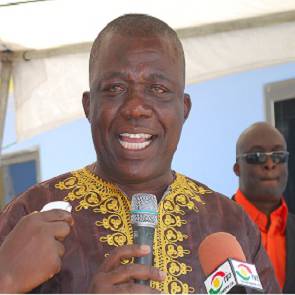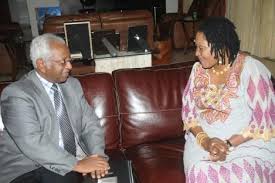 “I’m confused and don’t know whether I should continue my education to the university. I am scared the university education will not pay off after I spend the next four years of my life studying.”
“I’m confused and don’t know whether I should continue my education to the university. I am scared the university education will not pay off after I spend the next four years of my life studying.”
Those were the words of Nhyira, an 18 year old girl who had passed her Senior High Education certificate exams with excellent grades. She is expecting to gain admission to pursue B.A Sociology in the University of Ghana. Nhyira is the first of four children and lives in the capital city of Ghana, Accra with her mother in a single room. Her father died when she was fourteen years old. Her mother, a poor widow continues to engage in petty trading to take care of the family.
“It was a difficult time for the family when my dad died. He was a civil servant so didn’t really have enough money. We were barely left with nothing after we took care of his funeral expenses. My mum however vowed to support me and my siblings in our education even if she had to sell all her belongings.”
Nhyira, is a Ghanaian name which means ‘blessing’ in the Akan language. Amidst tears, she tells me she is not convinced she can be that blessing to her mother and siblings. Now her major worry is whether to continue her education to the tertiary or abandon it to start some petty trading to support her mother and younger siblings. She tells me it will be difficult for her mother to raise money to support her four years education in the university and that with the current high unemployment rate especially for university graduates, she would not want to graduate university and start struggling to find a job.
“I have heard many graduates complain there are no jobs and seen them stay at home after their National Service. I don’t want this to happen to me.”
Nhyira’s dilemma is not peculiar. The youth in Ghana especially university graduates are at wits end with what to do with their lives. The unemployment rate in Ghana is alarming, albeit it is difficult to access the exact statistics. The last population census held in 2010 and previous years did not factor in the determination of the unemployment rate in the country. The country’s inability to determine the number of unemployed has made it difficult for successive governments to determine the skills the youth have and how they can fit into the job market.
Despite this, those who find a job lament they are not being paid well. A little research I conducted reveals that some first degree holders are earning between 300 to 700 Ghana cedis as net monthly salary. This is equivalent to 81- 189 US dollars. The current minimum wage is 6 cedis, equivalent to 1 dollar 62 cents.
With this range of monthly salary one is hardly able to pay transportation to and from work, pay rent, electricity, water bills as well as cater for contingencies such as health care. It is a rough way of living and many live from hand to mouth. The situation is being compounded by the depreciation of the cedi against the dollar. The cedi has depreciated by 14.6% in the second quarter of 2014. Ghana is struggling to maintain its status as a lower middle income country and many are facing hardship. Government has recently asked for a bail out from the IMF.
The frustration of unemployed youth in Ghana cannot be underestimated. In an effort to find ways of tackling the situation, a group known as Unemployed Graduates Association of Ghana, (UGAG) exists. It was formed in 2010 and seeks to mount pressure on government to find lasting solution to the unemployment menace confronting the country. The Director of Operations of the association, Desmond Bress-Biney says their proposals to government have not been adhered to.
“Graduate in Teaching will help solve teacher deficit. This was one of the critical areas we touched on during our last meeting with the Minister of Employment and Labour Relations, Moses Asaga and his deputy, Antwi Boasiako Sekyere in 2012.”
In spite of the economic hardship Ghana is currently facing, some youth have found the need to venture into entrepreneurship instead of searching for jobs which are mostly non-existent. Government under the President John Mahama administration in recognizing that entrepreneurship is the key to reducing the unemployment rate has launched an entrepreneurship fund, ‘Youth Enterprise Support’ with a capital of 10 million Ghana cedis. The initiative is dedicated to growing Ghana’s economy by tapping into the creative and innovativeness of young entrepreneurs aged between 18 to 35 years through the provision of financial support and expert advisory support for their businesses.
Even though many see this move by government as commendable as it might help people who find themselves in Nhyira’s situation to become entrepreneurs, others fear this will push more youth to reconsider whether to pursue higher education or abandon it to venture into entrepreneurship. The Director of Operations of UGAG, Desmond Bress-Biney although believes in creating entrepreneurs says the association does not believe in setting up parallel institutions to create jobs.
“Although YES is a laudable idea, will GYEEDA continue to operate? What happens to GEBBS? Why is YES not handled on non-partisan platform? The issue of youth unemployment must be handled as a national issue and given the necessary attention like we gave to the Girl Child education. The only way to solve unemployment is to create jobs.”
Previous modules under the Ghana Youth Employment and Entrepreneurial Development Agency (GYEEDA) which was established in 2006 to tackle the unemployment situation in the country was rocked with a series of scandals when some misappropriation of funds were uncovered in 2013 by Investigative Journalist, Manasseh Azure Awuni. Government has been advised to tread cautiously with the implementation of the Youth Enterprise Support. Meanwhile, the benefits of pursuing the highest form of education cannot be overemphasized hence there is a need to tackle the unemployment menace in Ghana wholly.
Contact author at: ahmed.nabil38@gmail.com





